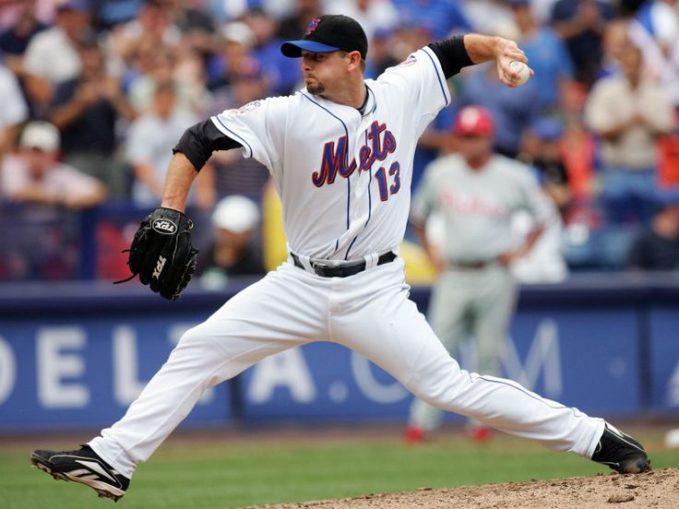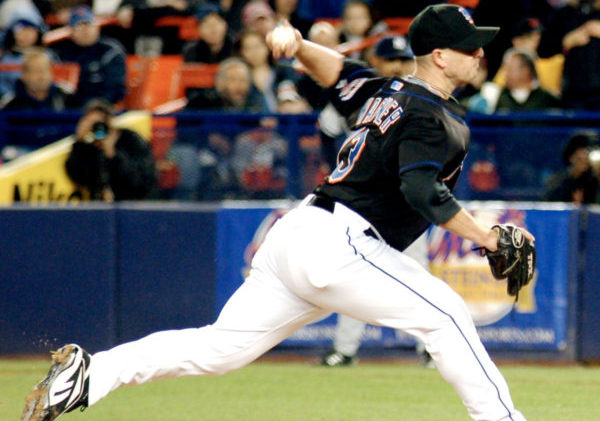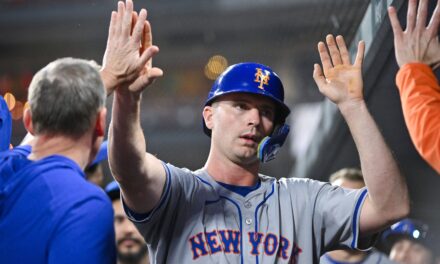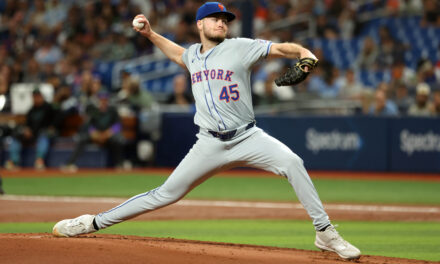
The New York Mets caught lightning in a bottle in 2006. And for a brief moment, it was glorious. But, as is life on Roosevelt Ave. in Flushing, the good times didn’t last.
A first-round draft pick of the Houston Astros in 1993 (12th overall out of Ferrum College in Virginia), Billy Wagner made a name for himself very early on. He pitched to a 2.35 ERA (2.52 FIP) with 14.02 strikeouts per nine innings from his MLB debut in 1995 through the 1999 season (224 games, 253 innings).
Following his first All-Star Game selection in 1999, Wagner began experiencing velocity issues during the 2000 season. A mid-June MRI confirmed a torn flexor tendon in his left elbow, shelving him for the remainder of the year.
Wagner got right back to work the following season, pitching to a 2.73 ERA with 79 strikeouts in 62.2 innings of work, and he didn’t stop there. A stellar campaign in 2002 (2.52 ERA, 35 saves) led to an elite 2003 season (1.78 ERA, 105 strikeouts in 86 innings), but Wagner’s stay in Houston came to an end that offseason.
After publicly decrying Houston’s dedication to fielding a contending ball club, Wagner was traded to the Philadelphia Phillies in early November for a combination of young pitchers that included Taylor Buchholz and Brandon Duckworth. That turned out to be an incredibly short-sighted move on Houston’s part.
As expected by many, if not all, around baseball at the time, Wagner continued to dominate in Philly. None of the three players included in the return to Houston quite panned out — at least not to Wagner’s level of production — and one has to wonder if the Astros’ march to the 2005 World Series would have turned out differently if Wagner was there instead of Brad Lidge.
As effective as the right-hander was in the regular season that year (2.29 ERA, 42 saves), Lidge was mostly ineffective in the postseason, allowing six earned runs over 8.2 innings between the NLCS and the World Series, losing to the White Sox in four games.
Back to Billy The Kid.
Following an injury-shortened but wholly effective debut season in Philadelphia (2.42 ERA, 59 strikeouts, 48.1 innings), Wagner had a banner year in 2005, pitching to a 1.51 ERA with 87 strikeouts and a career-best 293 ERA+ over 77.1 innings of work. His zenith couldn’t have come at a better time.

With Wagner now entering free agency for the first time in his career, the New York Mets — thirsty for an elite-level closer and seemingly unconcerned with payroll, as evidenced by the lucrative signings of Pedro Martinez, Tom Glavine, and Carlos Beltran the previous offseason — came calling to the tune of four years and $43 million.
Clubhouse differences may have forced Wagner out of Philadelphia — Pat Burrell took exception to Wagner’s public midseason comments regarding the Phillies’ lack of “spirit” in 2005 — but the Mets welcomed him with open arms.
The closer’s spot has been a perpetual hot seat in Queens, historically. Outliers include Tug McGraw and John Franco, among a handful of others, but none were immune from occasional fear-inducing, late-game appearances with a lead hanging in the balance during their tenures here.
Franco, late-90’s/early-2000s power arm Armando Benitez, and even Braden Looper — New York’s closer in 2005 — had their moments (some more than others), but taking into consideration the trajectory those mid-2000s Mets teams were on, manager Willie Randolph needed someone to shut the door with authority.
And that, he did. Wagner was an integral cog in the Mets’ push to the NLCS in 2006, pitching to a 2.24 ERA with 94 strikeouts in 72.1 innings, picking up 40 saves in 59 appearances (five blown saves), and earning a sixth-place finish in NL Cy Young Award voting.
He began the 2007 season on a strong note, pitching to a 1.64 ERA in the first half — picking up his fifth All-Star nod — but things soured fast. Wagner began experiencing lower-back issues later in the year, resulting in an ERA over 6.00 in August and a 3.90 ERA in the second half.
Another strong first-half in 2008 (2.31 ERA, 22 saves) secured Wagner his sixth career All-Star Game selection, but he would appear in just seven games in the second half before being diagnosed with a torn UCL in September, effectively ending his tenure in Queens.
As Wagner pointed out during his injury-announcing press conference, the Mets had the option to buy out his contract for $1 million following the 2008 season, leading most to believe his time in Flushing had run its course.
The Mets, instead, chose to keep him on the payroll at $9 million. Wagner rehabbed, made two appearances in August 2009 before being picked up on waivers by Boston, then finished his career in Atlanta in 2010, picking up his seventh-and-final All-Star appearance with a pristine 1.43 ERA over 71 appearances.
Billy Wagner’s time with the New York Mets was highlighted by impeccable performances on the mound but was also overshadowed by a personality that some may have found a bit too brash at times. That’s unfortunate.














